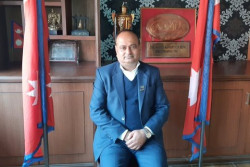Crime

The camera of the mobile phone - mounted on a mini tripod - aims to capture an innocent toddler. Seemingly well-briefed, the little one smiles, stands up and randomly moves his body to the tunes of a viral South Indian song.
The two or so years old toddler barely understands what he is doing. However, someone from behind the camera – one of his guardians – records his activity. The video has been uploaded on Tiktok, a social media app that has become a household name in Nepal of late.
The toddler is not alone. He is one of the hundreds if not thousands of Nepali infants or children whose – dancing, singing or simply talking – videos or photos have already been uploaded on social media apps like Facebook, Snapchat, or Tiktok.
Security issues
But experts say, the infants or children remain absolutely clueless about what they are being exposed to, or what psychological, social or digital security impacts such posts will have on them or their families in future.
Another similar video posted on Tiktok shows a baby girl dressed in a colourful red outfit with makeup on. Keeping the phone on a window pane, she shows some dance moves in front of the camera. The lady on her side – who’s out of camera frame - teaches her some dance steps.
Even though dancing and singing in front of a camera are not necessarily bad, police and child protection officials say, one needs to be aware of the consequences of allowing minors to use social media. While most parents seem ignorant, they seem to be competing against their peers to post contents of their kids on social media and make them viral.
1657784060.jpg)
With a sharp rise in the number of internet users in Nepal – 11.51 million in early 2022 as per DataReportal – children too have started figuring high on social media posts. You can see some of these contents by searching hashtags like #childrenvideos #kids and #Nepalibaby to name a few.
But as the saying goes ‘everything that glitters is not gold’, experts seem worried that exposing infants and children to social media could lead to problems like cyber abuse, bullying, false marketing, and other dangerous viral trends.
Growing internet crimes
Nepal’s police officials already know it: social media platforms may have some advantages, but they are emerging as a good medium for criminals like child traffickers, and paedophiles who have been found luring kids to a range of sexual activities.
And such criminals are present in every social media app, including Tiktok, Facebook, Twitter, Snapchat, and they have already victimised many adults in Nepal, says SSP Nabindra Aryal, spokesperson of the Nepal Police Cyber Bureau.
He told NepalMinute: “Because of parents, children also get addicted to social media. They are always engaged in one or the other app. This not just increases crime but invites health hazards too.”
And because more and more minors and kids enjoy unscrutinised access to mobile phones, police have started dealing with “quite strange” cybercrime cases.
1657788835.jpg)
“In some cases, both the culprit and the victim have been minors,” Aryal said. “The children want to be seen in movies, mostly. So, they upload videos to be noticed and get viral overnight. We have online child abuse and exposition cases. Sometimes, people track children and physically approach them.”
Though the number of applications filed at the Cyber Bureau has decreased to some extent, the cybercrime activities have still continued.
SSP Aryal stated: “Nepal does not have similar criminal activities as in the west because of our limited internet usage. But that does not mean we can deny possibilities of many other criminal activities here.”
Generally, he added, “whatever happens in foreign countries, it happens here too.”
Health hazards
Crime risks aside, excessive mobile phone use poses serious health risks too. Dr Anzela Regmi, a consultant psychiatrist based in the western district of Pyuthan, said: “Screen time plays a big role when using social media apps.
Different study reports suggest different impacts.
She added: “There is constant overflow of information about every topic, and too much information is harmful. This over-information affects the attention-span of not just children but also adults. Because of social media, the virtual world becomes so attractive to users that they start grasping the information quickly.”
Too much time in the virtual world means too little time for the real world or human interactions – things required for healthy development of a child.
When children start remaining hooked to social media, Dr Regmi said, “They idolise the influencers and assume everything that happens in the virtual world to be real. As parents do not inform their kids prior, the kids start taking everything seriously. This causes emotional and behavioural problems in children such as phobia and poor social skills.
1657784389.jpg)
“Adolescents go through self-esteem issues and start comparing themselves with others. They will not be able to differentiate between what is real and what is not real.”
Although based in the western district of Pyuthan, with a much smaller population compared to Kathmandu valley, Dr Regmi is already swamped with cases of children suffering from various mental illnesses stemming from excessive screen-time.
The most common problem according to her is irregular sleep patterns because of excessive mobile phone use. She suggests parents to “follow the age-appropriate screen time so that the children are not affected mentally, physically, and psychologically”.
She said: “Parents need to engage their children in skill-enhancing activities and outdoor activities such team sports. Also, they can make a routine for both children and parents. Parents need to give their time to children.”
Government rules
Also, the government of Nepal’s Online Child Protection Procedure, 2021, Section 86 (1) of the Children’s Act requires everyone to follow these rules:
• Schools need to give safe PCs and networks, screen the activities of youngsters on the web and introduce channels to safeguard minors
• Set up a complaint settlement framework to take a gander at issues of child abuse emerging inside the schools
• Urge students to report online abuse and build their ability for safe surfing and how to utilise the reporting
• Public libraries have to abide by the rules set for schools. Cyber cafes need to ensure that no minor less than 14 years of age can access the internet in the cafes unattended
• Online service providers will have to make their platforms safe for children
• Internet service providers (ISP) should provide guardians or caregivers with tools that protect children online and control the access
• Websites and social media platforms should ensure that their platforms are free of online child abuse content with immediate takedown when any abuse is reported or observed






